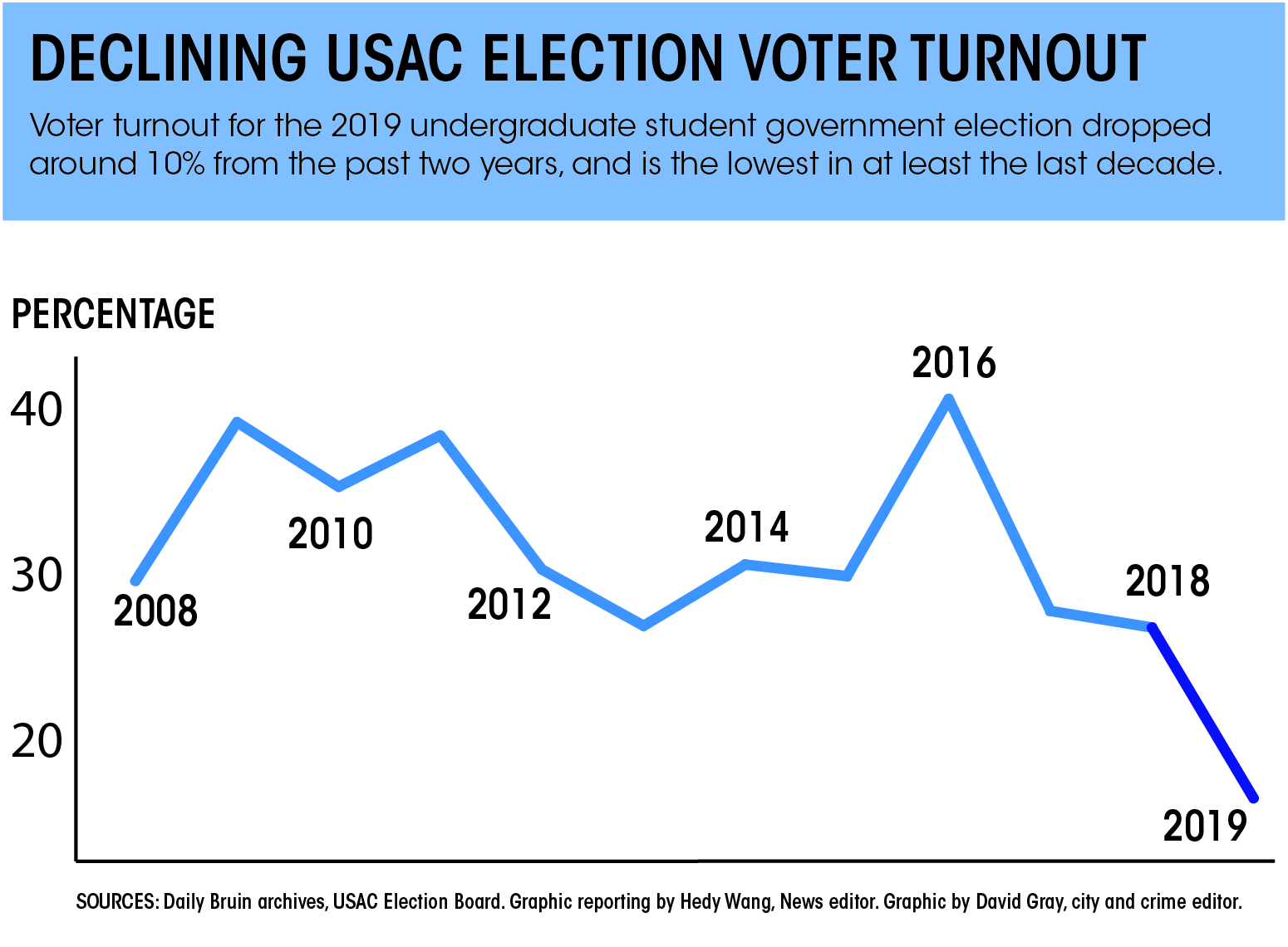 Student government voter turnout dropped to its lowest point in at least 11 years.
Student government voter turnout dropped to its lowest point in at least 11 years.
Only 16.18% of students voted in the 2019 Undergraduate Students Association Council election last week. Sixteen candidates ran for 12 positions, less than half of the number of candidates that ran in the 2018 election.
Voter turnout dropped about 10% from the 2017 and 2018 elections, which had a 27.5% and 26.5% turnout, respectively. Turnout has fluctuated over the past 11 years in an overall declining trend.
Kyana Shajari, the USAC Election Board chair, said she thinks the election board and council’s failure to sufficiently publicize the election contributed to the low voter turnout.
“The former chair failed to publicize the election as much as he could have, and I failed to publicize the election. Just because of all the circumstances I had to deal with, publicity was the last thing on my mind,” Shajari said. “For me, it was more of like a cleanup mission.”
Shajari also said she thought the 2018-2019 council could have done more in terms of publicity, but added she thought it appointed people to the election board as quickly as it could considering Richard White, former election board chair was removed two weeks before potential candidate election materials were due.
Shajari said she thinks the disorganization of and controversy surrounding last year’s election may have contributed to feelings of mistrust toward USAC as a whole. During the 2018 election, the candidates received a total of 56 sanctions, and several were investigated for voter coercion.
Kimberly Bonifacio, the newly elected internal vice president, said in an email statement she thinks changes made to the election calendar that were initially announced one day before the deadline may have contributed to the low voter turnout.
“Lastly, the toxic, petty politics from previous years has really affected students’ trust on USAC,” Bonifacio said.
Michael Lee, a fourth-year computer science student, said he voted in previous elections but not in this year’s because he knew someone on the ballot those years, but did not know any of the candidates personally this year. He added he heard less about the election in general because there was less drama surrounding the election.
Aaron Boudaie, a former Financial Supports commissioner, said in an email statement he thinks the election was inaccessible due to the lack of publicity.
“The devastating low participation level in voting and candidacy for the USAC election are not some natural disaster for which there is no explanation,” Boudaie said. “The candidate filing period was not advertised.”
Boudaie said he thinks the election board should have made changes to the election board calendar to accommodate changes made to the election board personnel.
Even after the election, three seats on the council are still vacant. A special election will be held in the fall for the Financial Supports commissioner and two general representative seats.
Shajari said she plans to continue her post as election board chair for the upcoming year if she is reappointed, and said she thinks many improvements could be made to the election code.
“I’ve seen a lot of things that have gone wrong and I have a vision for how I could fix them, so hopefully they’ll go smoother, because there’s going to be fall and spring election,” Shajari said. “It’s definitely going to be a trial and error, as it is every single year, but hopefully it’ll go well.”
Contributing reports by Isabella Fortier and Andrew Fortin-Caldera.
No matter the reasons why — when apathy wins, everyone loses.